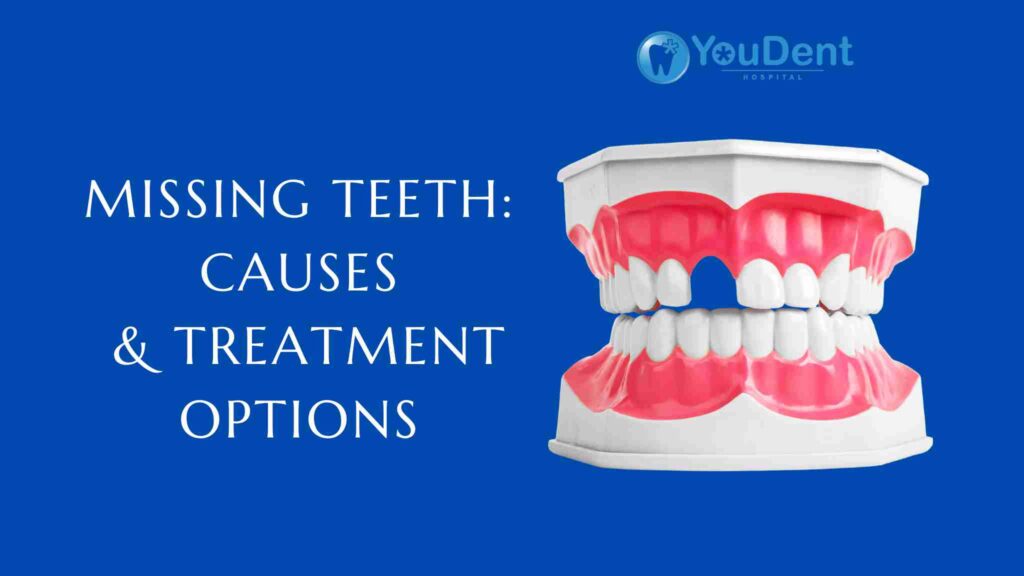Missing teeth can affect your daily life more than you might realise. From chewing your favourite foods to confidently smiling in photos, our teeth play a crucial role in overall health and self-esteem. But what causes tooth loss, and what can you do about it? Let’s dive into the common causes, effects, and treatment options for missing teeth.
Common Causes of Missing Teeth
Tooth Decay and Cavities
Tooth decay is a leading cause of tooth loss. When cavities are left untreated, they can erode the tooth structure and damage the roots, ultimately leading to tooth extraction or loss.
Gum Disease (Periodontitis)
Gum disease is another major contributor to missing teeth. It weakens the gums and bone structure supporting the teeth, causing them to loosen and eventually fall out.
Trauma or Injury
Accidents, falls, or sports injuries can result in broken or knocked-out teeth. While some cases can be treated immediately, others may lead to permanent tooth loss.
Congenital Missing Teeth (Hypodontia)
Some people are born without certain teeth due to a condition called hypodontia. This can affect the alignment and overall functionality of the teeth.
Poor Oral Hygiene
Neglecting oral hygiene can lead to both decay and gum disease, significantly increasing the risk of tooth loss over time.
Effects of Missing Teeth
Impact on Chewing and Digestion
Missing teeth can make chewing difficult, affecting your ability to enjoy and properly digest food.
Changes in Facial Structure
Teeth support your facial muscles. Losing them can cause your face to sag or appear sunken, making you look older than your age.
Effects on Speech
Teeth play a key role in forming sounds. Missing teeth can lead to slurred or unclear speech.
Emotional and Psychological Effects
A missing tooth can take a toll on your confidence, causing embarrassment and reluctance to smile or speak freely.
Treatment Options for Missing Teeth
Dental Implants
Dental implants are one of the most popular and effective solutions for missing teeth, and when combined with the best smile designing treatment in Jaipur, they can help you achieve a flawless smile.
- Benefits: Durable, natural-looking, and long-lasting.
- Procedure: Involves surgically placing a titanium post into the jawbone, followed by attaching a crown.
Dentures
Dentures are removable prosthetics that replace missing teeth.
- Types: Full dentures (for all teeth) and partial dentures (for some teeth).
- Pros and Cons: Affordable and non-invasive but may feel uncomfortable and require regular maintenance.
Dental Bridges
Dental bridges use adjacent teeth as anchors to replace missing ones.
- Types: Fixed bridges and cantilever bridges.
- Suitability: Ideal for people with strong surrounding teeth.
All-on-4 Implants
This innovative technique involves securing a full arch of teeth on just four implants.
- Who Can Benefit: Perfect for those missing most or all of their teeth.
Preventing Tooth Loss
Regular Dental Check-ups
Visiting your dentist regularly helps catch and address dental issues early, reducing the risk of tooth loss.
Maintaining Oral Hygiene
Brushing twice daily, flossing, and using mouthwash can keep your teeth and gums healthy.
Using Mouthguards During Sports
Protective gear can prevent trauma-related tooth loss during high-contact activities.
Addressing Dental Issues Early
Treating cavities, gum disease, and misalignment promptly can save your teeth in the long run.
Conclusion
Tooth loss may seem like the end of the road, but it’s not. With advancements in dentistry, there are numerous ways to restore your smile and confidence. Whether it’s dental implants, bridges, or dentures, the right treatment can make all the difference. If you’re dealing with missing teeth, consult the best dental clinic in Jaipur to explore your options and take the first step towards a healthier smile.
Frequently Asked Questions
What are All-on-4 dental implants?
All-on-4 dental implants are a method of replacing an entire arch of teeth using just four implants, providing a stable and secure foundation for prosthetic teeth.
How much do All-on-4 dental implants cost?
Costs can range from 1,50,000 to 3,00,000 per arch, depending on various factors including location, dentist expertise, and specific patient needs.
Are All-on-4 implants suitable for people with low bone density?
Yes, the strategic placement of implants minimizes the need for bone grafting, making it suitable for many patients with lower bone density
How long do All-on-4 implants last?
With proper care, All-on-4 implants can last a lifetime, offering a permanent solution to tooth loss.
What are the benefits of advances in dental technology for All-on-4 implants?
Technological advancements like digital imaging, guided surgery, and 3D printing enhance precision, customization, and overall success rates of All-on-4 implants.

